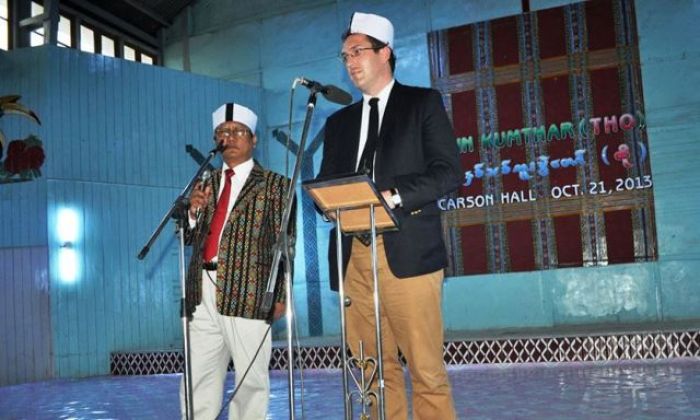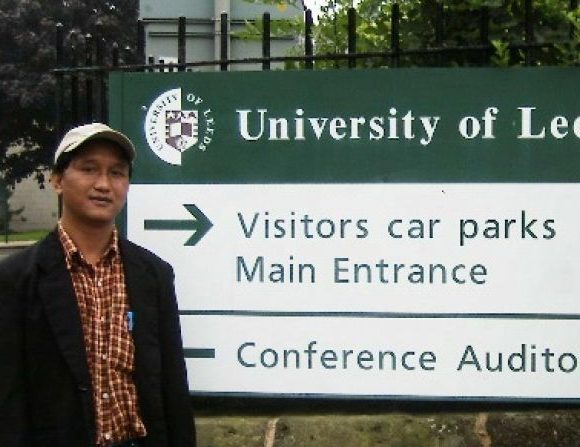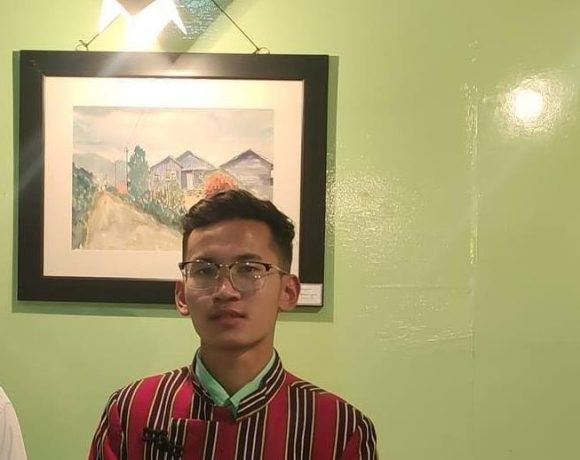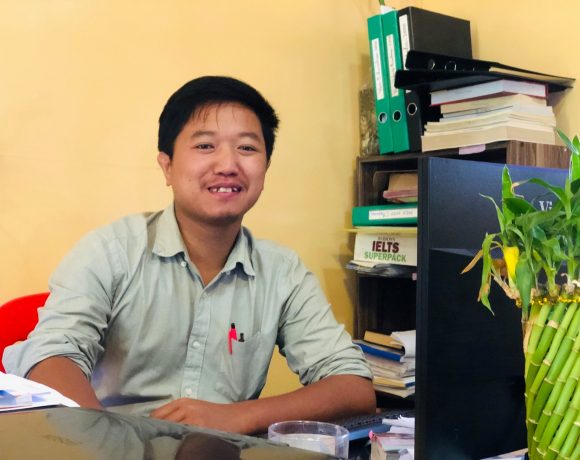“A change in atmosphere, not yet a change in system”: Interview with Benedict Rogers

02 December 2013 – Benedict Rogers, East Asia Team Leader, of the Christian Solidarity Worldwide (CSW), has just returned from a trip to Chin State, Burma’s least developed state on the western border.
It was the first time Mr. Rogers, who had travelled to both the Indian and Thai borders several times in the past, has been to Chin State.
In this Chinland Guardian interview, Mr. Rogers talks about his new experiences, the impacts of current reforms on the people on the ground, and more.
Chinland Guardian: What made you decide to visit the country’s least developed state and where did you go?
Benedict Rogers: I was invited by the Global Chin Christian Fellowship (GCCF), to visit Hakha and contribute to a three-day workshop on the Church’s contribution to peace-building. I have worked with Chin people for the past ten years, and been involved with Burma for almost 15 years. I have visited Chin refugees in Mizoram on the India-Burma border, and in Delhi, Kuala Lumpur, and other places, but I have never been able to go into Chin State until now, so when I was invited to go, I was delighted to accept the invitation. I was privileged to be in Hakha for Chin New Year, and I also visited Kalay and Falam on the way. In Hakha, I visited many different places, but perhaps the most significant for me was to visit the grave and burial site of Rev. Carson, the first missionary to the Chin, and also the grave of the first Chin convert to Christianity.
Chinland Guardian: Tell us more about the training/workshop.
Benedict Rogers: The training was organized by GCCF and I was privileged to contribute, alongside other foreign friends. The theme was ‘The Church’s contribution to peace-building’, and it focused on the importance of basic human rights as part of peace-building. We discussed religious freedom, women’s rights, indigenous rights, economic, social and cultural rights and other aspects of universal human rights.
Chinland Guardian: During your stay in Chin State, who did you meet with and how are your reactions?
Benedict Rogers: We met a wide range of people, including Chin State government ministers, church leaders, elders of the community in Hakha, civil society activists. Everyone welcomed me in a wonderfully warm way, and I was deeply moved. It felt like a dream, because for years I had heard the names ‘Hakha’ and ‘Falam’ and had met people from those places, in exile or in Rangoon, but had never been able to go because Chin State was so closed to foreigners for so long. So I felt deeply privileged, and inspired, to be there.
Chinland Guardian: You have been to both the Thai- and Indian-Burma borders several times. Now you have entered the country and even travelled further inside. How do you feel about the situation in the border and inside?
Benedict Rogers: There is no doubt that there is positive change now in Burma, even outside Rangoon. I had previously thought that the increased space for civil society and freedom of expression was confined to Rangoon and the major cities, and was not reaching remote areas, but the fact that we could visit Chin State and conduct this workshop in Hakha, openly and freely, indicates that the expansion of freedom is reaching such areas. However, the real question is not whether there is change, but how deep and long-lasting the change will be. There are of course many challenges, many very grave issues in the country, and a very long way to go. But I feel that I have a glimpse of how Burma, including Chin State, could be, if the challenges are addressed. I have written about this in recent articles in the Wall Street Journal and Mizzima. I don’t want anyone to misunderstand me: my view is very simple. When I see positive changes, I will highlight them, applaud them and encourage them, and when I see problems, challenges, injustices I will highlight them and call for action to change them. So I know that there is a very long way to go, this is just the very beginning, and the situation is still very fragile, and there is much more that needs to change.
Chinland Guardian: How do you see the current reform in Burma in terms of its impacts on people on the ground, especially in ethnic areas?
Benedict Rogers: As I have said in my previous answer, there are some positive changes, but there is a very long way to go. My key observation is that the changes still amount to a change in atmosphere, not yet a change in system. For change to be real and long-lasting, it needs to involve reform of the constitution, repeal of unjust laws, an end to arbitrary arrests, the release of all remaining political prisoners, concrete efforts to establish the rule of law and end religious violence and intolerance and promote religious freedom and harmony, and a genuine peace process resulting in a political dialogue that leads to a political settlement establishing a federal democracy that respects equal rights and autonomy for all the ethnic nationalities. In the ethnic areas in particular, there needs to be real peace in order for lives on the ground to change for the better, and real peace can only be achieved through a political dialogue, a political settlement, and reconciliation, as well as respect for human rights. That means the army must change its behaviour, and stop attacking civilians in Kachin and northern Shan states, stop raping and torturing, stop land confiscation. But it also means the government must invest in enhancing the lives of the people, particularly in Chin State: investment in education, health care, roads and efforts to reduce poverty and promote livelihoods. Security of all kinds, whether it is political, physical or economic, is crucial to impacting the lives of people on the ground.
Chinland Guardian: We have seen an influx of NGOs and international organizations into Burma. Now, community leaders are worried that people will become an aid-dependent society. What can you say from your experiences to prevent this kind of situation from happening?
Benedict Rogers: This is certainly a danger, and it is a difficult question. I think there are two key principles needed. First, the international NGOs should partner closely with local civil society and local community-based organizations, who know the needs and long-term goals of their people and should be empowered to take the lead in helping their own people. It should not be just international NGOs coming in and doing it all. Of course there will be short-term needs which international NGOs will have to meet, but they must create a culture in which local NGOs are respected and empowered, and – crucially – are listened to. Second, capacity building, not just for civil society but for people as a whole. This involves a whole range of activities, but includes education of all sorts – academic, vocational, long-term study, short-term courses and workshops. It is vital for Burma’s future that the people themselves are empowered with the skills they need to build their country, rather than outsiders coming and building it for them without listening to them. It is their country, they must build it, and all foreign friends should do is support, advise, suggest and empower.
Chinland Guardian: What were the most challenging and enjoyable moments during your trip to Chin State?
Benedict Rogers: There were no really challenging moments, though the heavy rain and cold weather were a surprise. But they made me feel at home, because it felt like England! Of course, it was challenging knowing what message to give in the workshop, and in two churches where I was invited to speak, and on Chin New Year Day – I wanted to give a message of encouragement but one which also recognized the struggles which the Chin people had been through and continue to go through. The most enjoyable moments – the stunningly beautiful landscape of the Chin Hills, the wonderful faith, courage, fellowship, friendship and hospitality of the Chin people, the humour and companionship of those I had the privilege of travelling with, the privilege of contributing to a workshop on topics which would have been impossible to discuss not long ago, and simply the joy of finally being in Chin State, seeing the hornbill and the rhododendron images on the wall of Carson Hall, seeing Carson’s grave, worshipping with Chin brothers and sisters, and enjoying Chin food and homemade wine!#






